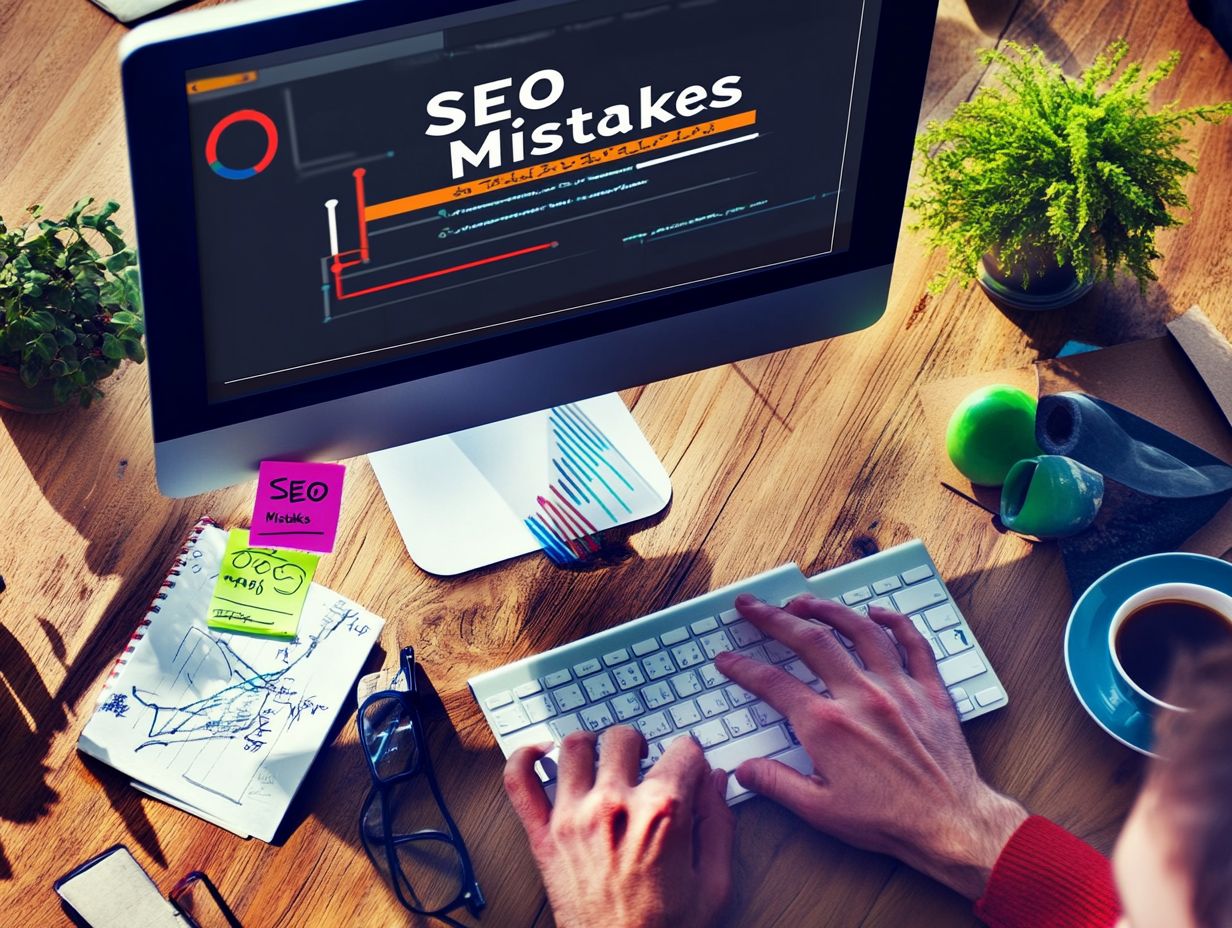5 SEO Mistakes to Avoid for Better Traffic
In today’s digital landscape, mastering SEO is essential for businesses aiming to elevate their online presence.
Many still trip over common pitfalls that can impede their success. From neglecting keyword research to overlooking local SEO, these missteps can have a significant impact on your traffic and visibility.
This article reveals five critical SEO missteps to avoid and provides actionable insights to refine your strategy.
Whether you’re a seasoned marketer or just beginning your journey, grasping these concepts can set you on the path to improved performance and enhanced visibility online.
Contents
- Key Takeaways:
- 1. Neglecting Keyword Research
- 2. Not Optimizing for Mobile
- 3. Ignoring On-Page SEO Factors
- 4. Not Building Quality Backlinks
- 5. Overlooking Local SEO
- What Are the Essential Components of a Successful SEO Strategy?
- How Can a Business Conduct Effective Keyword Research?
- What Are the Best Practices for Mobile Optimization?
- How Can On-Page SEO Be Improved?
- What Are the Benefits of Building Quality Backlinks?
- Why Is Local SEO Important for Businesses?
- How Can Businesses Avoid These Common SEO Mistakes?
- What Are the Long-Term Consequences of These Mistakes?
- What Are the Latest Trends and Updates in SEO?
- How Can a Business Stay Ahead in the SEO Game?
- What Are the Future Predictions for SEO?
- Frequently Asked Questions
- 1. What are the top 5 SEO mistakes to avoid for better traffic?
- 2. How does keyword stuffing affect SEO and traffic?
- 3. Why is duplicate content a problem for SEO and traffic?
- 4. How does mobile optimization affect SEO and traffic?
- 5. Why is metadata important for SEO and traffic?
- 6. How can backlinks improve SEO and traffic?
Key Takeaways:

- Neglecting keyword research can lead to targeting the wrong audience and missing out on potential traffic.
- Mobile optimization is crucial in today’s digital landscape and can really hurt your website’s performance!
- On-page SEO factors, such as meta descriptions and title tags, should not be ignored as they play a significant role in search engine visibility.
1. Neglecting Keyword Research
Neglecting keyword research is one of the most detrimental SEO mistakes you can make. It lays the groundwork for effective search optimization and directly impacts your organic traffic and visibility on search engines like Google.
Without a solid grasp of targeted keywords and search intent, you risk creating content that doesn t resonate with your audience. This leads to poor engagement rates and missed opportunities.
By investing time in thorough keyword research, you can uncover the terms and phrases your potential customers are actively searching for. This is crucial for crafting a relevant content strategy.
Techniques like analyzing competitors, utilizing tools such as Yoast for on-page optimization, and employing Rank Tracker for performance monitoring can provide invaluable insights.
Understanding the nuances of search intent whether users are seeking information, comparing options, or ready to make a purchase can significantly influence your content creation. This strategic approach not only aligns your content with audience needs but also drives organic traffic, ultimately boosting your rankings and conversions.
2. Not Optimizing for Mobile
Failing to optimize for mobile can significantly hinder your website’s performance, especially now that search engines like Google are prioritizing mobile devices. This shift is vital for enhancing user experience and addressing potential traffic issues.
In today s digital landscape, where more than half of all web traffic originates from mobile devices, it’s essential to design your website with mobile users in mind.
Implementing best practices such as responsive design and mobile-friendly formatting can greatly improve usability. This allows your visitors to navigate seamlessly across various screen sizes.
Neglecting mobile optimization can lead to ranking drops in search engine results, severely diminishing your visibility. This oversight negatively affects how users interact with your website, as frustrated visitors are likely to abandon sites that are difficult to navigate or read on their smartphones, ultimately impacting your business s bottom line.
3. Ignoring On-Page SEO Factors
Neglecting on-page SEO factors can drastically undermine your website’s potential for achieving high Google rankings. Effective content optimization and SEO-friendly formatting are essential for boosting your visibility and enhancing conversion metrics.
To truly harness the power of on-page SEO, you must concentrate on several key components. For instance, leveraging meta tags effectively provides search engines with critical context about your page’s content. Crafting appropriate headers not only organizes your information but also enhances readability, making navigation a breeze for users.
Internal linking is another essential element. It connects relevant pages and distributes the credibility of your web pages throughout your site, enhancing user engagement. It’s imperative to avoid duplicate content, as it can perplex search engines and dilute your ranking potential.
By implementing these actionable strategies, you can significantly elevate your on-page factors. This ultimately supports a broader SEO strategy that prioritizes user experience and site performance.
Ready to improve your SEO strategy? Start applying these tips today for better results!
4. Not Building Quality Backlinks
Neglecting to build quality backlinks is one of the major SEO mistakes that can lead to significant drops in traffic and even SEO penalties. Search engines place a premium on websites with strong backlink profiles, as they enhance credibility and authority.
Quality backlinks are essential for improving your website’s ranking. They drive organic traffic.
Engaging in effective link-building strategies like guest posting and outreach helps you build relationships with reputable websites, creating opportunities to share valuable content and earn those all-important backlinks. This collaborative approach not only boosts your visibility but also positions your site as a trusted source within its niche.
On the flip side, overlooking the importance of backlinks can stifle your site’s potential, leading to a diminished online presence and even penalties from search algorithms (the rules search engines use to rank websites) that favor well-linked sites over others.
5. Overlooking Local SEO
Overlooking local SEO can limit your business’s reach and opportunities, particularly if you run an e-commerce site that thrives on local visibility and targeted audience insights to enhance user engagement and drive foot traffic.
In today s digital landscape, local SEO is essential for connecting your business with nearby customers. By optimizing for local search results, you can greatly increase your chances of being discovered by potential clients actively seeking your products or services in their area.
To effectively enhance your local SEO, it s crucial to claim and optimize your Google My Business listing. This step not only helps establish a robust online presence but also encourages engagement through reviews and local posts. Incorporating local keywords into your website content significantly boosts relevance and visibility.
By integrating local SEO strategies, you ll strengthen your overall SEO efforts and cultivate a more targeted audience, ultimately leading to higher conversion rates and increased customer loyalty.
What Are the Essential Components of a Successful SEO Strategy?

A successful SEO strategy integrates various essential components, including a comprehensive website audit, an effective content strategy, and diligent search optimization each vital for enhancing how easily search engines can access your site and improving your rankings in today s ever-evolving search algorithms.
A detailed website audit serves as your foundation, uncovering technical issues that could hinder performance, like slow page speeds or broken links. By identifying these weaknesses, you can make informed decisions to enhance both user experience and search visibility. Understanding the competitive landscape through thorough research allows you to pinpoint gaps in your tactics, enabling strategic adjustments that propel you ahead of the competition.
These elements work in harmony fixing technical issues boosts crawlability, while a robust content strategy tailored to your target audience ensures the right information reaches potential customers. Together, they create a snowball effect, significantly amplifying your overall SEO effectiveness.
How Can a Business Conduct Effective Keyword Research?
Effective keyword research is crucial for your business s success. It helps pinpoint targeted keywords that truly resonate with your audience’s search intent. By leveraging various SEO tools and techniques, you can uncover valuable insights that will drive your strategy.
This process begins with compiling a list of potential keywords and phrases that are relevant to your industry. Tools like WebSite Auditor provide you with crucial data on search trends and competition levels, enabling you to conduct a thorough assessment of keyword viability. After that, using Rank Tracker allows you to analyze the ranking positions of your selected keywords, uncovering additional opportunities for enhancement.
It’s equally important to dive into search intent, grasping whether users are in pursuit of information, ready to make a purchase, or seeking a service. By examining audience demographics, you can further refine your keyword strategies, ensuring they align perfectly with the needs and preferences of your target market.
What Are the Best Practices for Mobile Optimization?
Implementing best practices for mobile optimization is essential for enhancing your user experience. In today’s world, mobile-first indexing greatly influences Google rankings.
A seamless mobile experience meets users expectations and plays a vital role in how search engines evaluate a site s relevance. By using responsive designs, your content will adapt effortlessly across various devices, maintaining both functionality and aesthetic appeal.
Optimizing images and minimizing server response times can lead to faster loading speeds, which is crucial for keeping users engaged. Prioritizing these strategies creates an engaging environment that encourages users to stay longer on your site, ultimately boosting your search rankings and visibility in an increasingly competitive digital landscape.
How Can On-Page SEO Be Improved?
Improving your on-page SEO requires careful content optimization, with attention to internal linking and ensuring your formatting is SEO-friendly to boost conversion metrics.
Concentrating on optimizing your meta descriptions, using header tags effectively, and eliminating duplicate content can significantly enhance webpage quality. These strategies guide search engines in indexing your content correctly and improve user engagement by making information more accessible.
When users find well-structured content with a clear hierarchy and compelling meta descriptions, they are more likely to stay on the page. This tells search engines your site is valuable, helping you stand out! Ultimately, these enhancements lead to higher rankings in search results, positioning you for greater visibility and success.
What Are the Benefits of Building Quality Backlinks?
Building quality backlinks is a foundation of your effective SEO strategy. Not only do they enhance your website’s authority, but they also significantly boost user engagement and organic traffic.
Think of these links as votes of confidence from other sites, signaling to search engines that your content is credible. Capturing high-quality backlinks increases your chances of climbing the search rankings, leading to enhanced visibility and potentially a larger audience.
Common strategies for acquiring these valuable links include:
- Guest blogging: Write articles for other sites in exchange for a link back.
- Pitching informative content: Share valuable insights with relevant online publications.
Maintaining a healthy backlink profile is crucial; it helps prevent penalties from search engines and ensures sustainable growth in referral traffic over time. Start building those valuable links today to boost your visibility!
Why Is Local SEO Important for Businesses?
Local SEO is essential for your business to capture specific geographic markets. It enhances your visibility in local search results, boosting audience research and user engagement through tailored strategies.
Today, consumers are urgently searching for products nearby, making local SEO vital! By implementing localized keyword strategies, you can increase your chances of appearing in searches conducted by potential customers right around the corner.
Strategies such as optimizing your Google My Business profile, encouraging customer reviews, and engaging with local community events can solidify your online presence. By understanding your local audience’s demographics and preferences, you can tailor your marketing efforts to resonate effectively with the community you serve.
How Can Businesses Avoid These Common SEO Mistakes?

You can sidestep common SEO mistakes by conducting regular website audits and focusing on a strong content strategy that tackles SEO issues and improves traffic.
This proactive approach helps you identify areas for improvement and tweak your tactics when necessary. You must stay informed about the evolving SEO trends and best practices to succeed!
By consistently revisiting and refining your keyword strategies, optimizing meta tags, and ensuring mobile compatibility, you can significantly enhance your visibility. Don t forget to invest time in analyzing your competitors’ strategies to uncover gaps in your own.
By fostering a culture of continuous learning and adaptation, you can lay the groundwork for sustained online growth and resilience in the competitive digital landscape.
What Are the Long-Term Consequences of These Mistakes?
Neglecting SEO best practices can have serious long-term consequences, including significant drops in traffic, potential penalties, and even content decay, all of which compromise your website s Google rankings and user trust.
Consider the experience of a popular e-commerce site that failed to keep up with regular content updates and keyword optimization. Over just two years, it faced an alarming 50% decrease in organic traffic. This decline was further exacerbated by outdated product descriptions that no longer resonated with current search trends.
In another case, a different website saw its rankings plummet due to poor link-building strategies that went against search engine guidelines. These scenarios highlight the critical need to adapt and enhance SEO practices.
It is essential for businesses to consistently analyze and refine their strategies to protect their online presence and ensure sustainable success.
What Are the Latest Trends and Updates in SEO?
Staying informed about the latest trends and updates in SEO is essential for your business, especially as search algorithms evolve at a rapid pace, influencing key factors like mobile optimization and user experience.
With the rise of voice search and artificial intelligence, these advancements are fundamentally altering how users interact with search engines. Providing a seamless mobile experience is no longer just a nice-to-have it’s a necessity if you want to capture consumer attention.
As Google increasingly emphasizes user-centric metrics, prioritizing engaging content that truly meets your audience’s needs is crucial! By adapting your strategies to embrace these innovations, you can not only boost your search rankings but also elevate your overall online presence.
This proactive approach will help ensure your business remains competitive in an ever-evolving digital landscape.
How Can a Business Stay Ahead in the SEO Game?
To stay ahead in the SEO game, prioritize competitive research and a deep understanding of your audience, leveraging SEO tools to enhance user satisfaction and adapt your strategies effectively.
By analyzing your competitors’ keyword usage and content strategies, you can identify gaps in your own approach, uncovering valuable opportunities to craft unique, engaging content.
Utilizing audience analytics tools allows you to grasp consumer behavior, preferences, and demographics. This enables you to create more targeted content and marketing campaigns.
This powerful combination not only helps you produce relevant materials that truly resonate with users but also guides adjustments to your SEO tactics based on real-time performance metrics. Consistently tracking these insights is crucial for making informed, adaptive decisions that lead to improved organic search visibility.
Start conducting your website audit today!
What Are the Future Predictions for SEO?
To succeed in SEO, focus on user experience now. Search algorithms are prioritizing mobile optimization and high-quality content more than ever to align with evolving consumer expectations.
You should integrate new technologies like Artificial Intelligence (AI) and machine learning into your strategies. Utilizing insights from data allows you to gain a deeper understanding of your audience’s behaviors and preferences, enabling you to craft more personalized and engaging content.
Optimizing for voice search and enhancing website accessibility will become crucial. More users are turning to smart devices. Embracing these trends not only ensures compliance with search engine requirements but also helps forge stronger connections with your customers. This ultimately paves the way for sustained success in an ever-evolving market.
Frequently Asked Questions
1. What are the top 5 SEO mistakes to avoid for better traffic?
Avoid these top 5 SEO mistakes to boost your traffic: keyword stuffing, duplicate content, neglecting mobile optimization, ignoring metadata, and misusing backlinks.
2. How does keyword stuffing affect SEO and traffic?
Keyword stuffing is when you overload your content with the same keyword. This looks spammy to search engines and can hurt your rankings.
3. Why is duplicate content a problem for SEO and traffic?
Having duplicate content on your website can harm your SEO and traffic. Search engines may struggle to determine which version of the content is most relevant, leading to lower rankings.
4. How does mobile optimization affect SEO and traffic?
With the increasing use of mobile devices, a non-optimized website can hurt your SEO. Search engines prioritize mobile-friendly sites, and users are likely to leave sites that are not easy to navigate on their devices.
5. Why is metadata important for SEO and traffic?
Metadata, such as title tags and meta descriptions, provides essential information to search engines about your website’s content. Neglecting to optimize your metadata can result in lower rankings.
6. How can backlinks improve SEO and traffic?
Backlinks, or links from other websites to your own, are vital for SEO. They signal to search engines that your content is reputable and valuable, often resulting in higher rankings and increased traffic.
Stay ahead in SEO by adapting to these trends now! Your website’s success depends on it.




